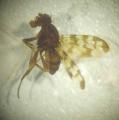Diptera.info :: Literature :: What is new?
|
Fabulous new book on fossils in amber
|
|
| AmberDiptera |
Posted on 29-09-2010 19:27
|
|
Member Location: Posts: 2 Joined: 29.09.10 |
Hi all, I would like to alert you to the publication of a fabulous new book on biodiversity of fossils in amber. Obviously it contains a lot of information about fossil flies as these are the most common inclusions. Photographs of fossils from the following families are included: Ceratopogonidae (with eggs), Drosophilidae, Psychodidae (synchrotron radiation 3D reconstructions), Cicidomyiidae, Dolichopodidae, Chaoboridae, Chironomidae, Periscelididae, Xylophagidae, Tipulidae, Anisopodidae, Hilarimorphidae, Limoniidae, Empididae and Scatopsidae (the oldest mating pair, in Lebanese amber). There are also examples of Leptus mite parasitism. Fly families are listed by name, according to their occurrence in the major world amber deposits as follows: Dominican (45 families), Mexican (31), Bitterfeld (23), Baltic (74), Rovno, Ukraine (27), Paris (6), Canada (23), New Jersey (9), Cretaceous French (10), Burmese (32), Spanish (17) and Lebanese (16). This is the amber book to out do all others. It is a compiled volume of contributed chapters covering all the major (and some otherwise poorly known or brand new e.g. Australia) amber deposits of the world. Each chapter is written by the leading world expert on that deposit and all follow a standardised format including an introduction, notes on the geological setting and on collecting the amber, the palaeohabitat, the amber producing tree, the age of the amber, its physical and chemical properties (specific for each deposit) and the biodiversity of the inclusions. Each chapter is fully referenced throughout. There is also a checklist of inclusions presented as an appendix to each chapter. The amount of information in this volume is tremendous. There is also a comprehensive introductory chapter that explains all the new techniques of study including computed tomography, how to take great photos of inclusions, and how to distinguish amber from fakes. Furthermore it is full of great colour photos and illustrations (370+), printed on high quality glossy paper and is published in hard back with a very attractive cover. Further information, including sample pages and ordering information can be found on the publishers website: http://www.siriscientificpress.co.uk Although it is a little expensive, it is a must for anybody with an interest in amber or the evolutionary history of insect diversity! |
|
|
|
| Tony Irwin |
Posted on 29-09-2010 20:53
|
|
Member Location: Norwich, England Posts: 7338 Joined: 19.11.04 |
Hi David, why not send a copy of your book to Paul? - he can arrange for it to be reviewed for Diptera.info. 
Tony ---------- Tony Irwin |
|
|
|
| AmberDiptera |
Posted on 30-09-2010 06:55
|
|
Member Location: Posts: 2 Joined: 29.09.10 |
Good idea...I am putting one in the post today. |
|
|
|
| Jump to Forum: |












